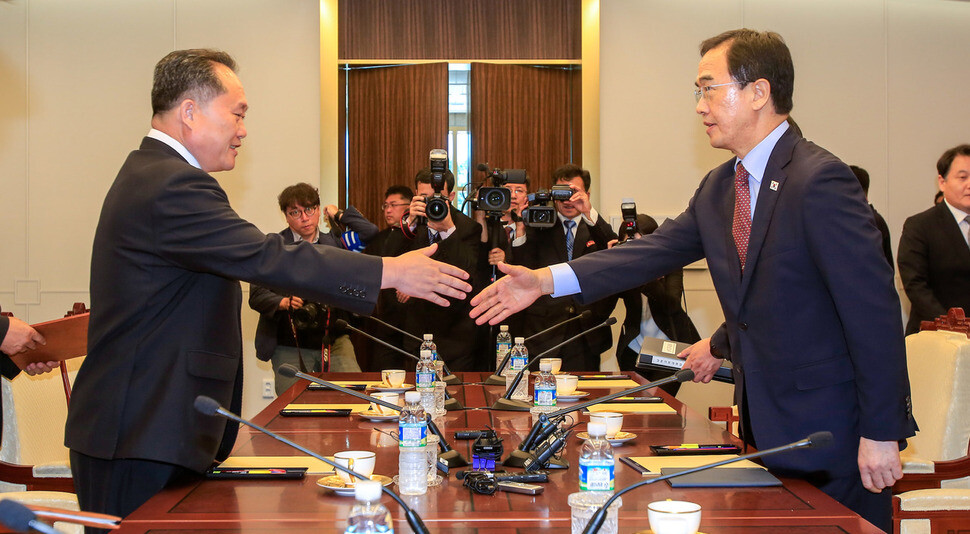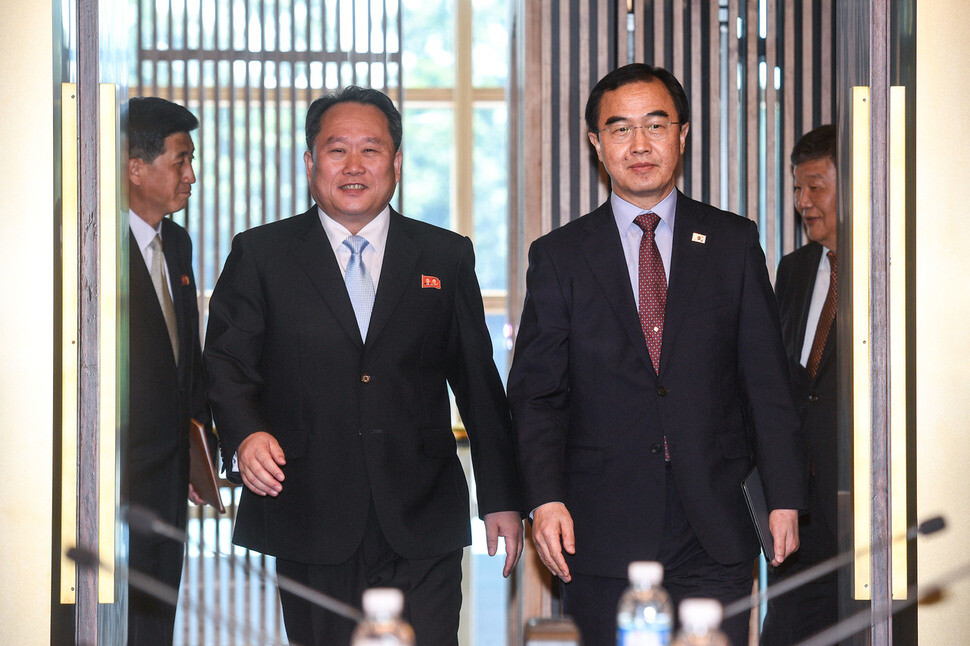hankyoreh
Links to other country sites 다른 나라 사이트 링크
South and North Korea agree to establish joint liaison office in North Korea’s Kaesong

During high-level talks at the house of Peace in Panmunjeom on June 1, South and North Korea agreed to soon establish a joint liaison office in the Kaesong Industrial Complex at which officials will be permanently stationed and finalized the schedule of military talks between generals, sports talks and Red Cross talks, which will take place during June. The two sides agreed to hold a discussion over correspondence about “ways to significantly commemorate” the imminent 18th anniversary of the June 15 Joint Declaration, but a joint event will not be held.
The high-level talks began at 10 am and ended at 5:42 pm, as delegates raced to complete the agenda. For issues on which they already mostly saw eye to eye, they quickly reached an agreement, while for matters on which they disagreed or needed further review, they decided to continue deliberations over correspondence instead of bickering about them.
This reflects the approach of “seeking agreement and respecting difference,” which gives converging opinions priority and puts diverging opinions on the back burner. This is the new culture of dialogue that has been produced by the two summits between South Korean President Moon Jae-in and North Korean leader Kim Jong-un. This improves the chances that the terms of the inter-Korean agreement will be implemented.
On June 1, Cho Myung-gyon, South Korea’s Minister of Unification, and Ri Son-gwon, chairman of North Korea's Committee for Peaceful Reunification, adopted and published the “Joint Press Release from the Inter-Korean High-Level Talks for Implementing the Panmunjeom Declaration,” which consists of three articles and six paragraphs altogether. The most striking part of the press release was the agreement to “establish a joint liaison office in the Kaesong Industrial Complex permanently staffed by government officials at an early date and to draw up the technical measures for this.”
This liaison office is supposed to serve as a site for ongoing deliberations between inter-Korean officials about such topics as the implementation of the Apr. 27 Panmunjeom Declaration. According to Cho’s explanation and documents provided by the South Korean government, South and North Korea have agreed that a South Korean team of inspectors will visit Kaesong to check the facilities prior to June 15, after which a temporary joint liaison office will be set up and operated while repairs and renovations are underway. South and North Korea defined the mission of the joint liaison office as “guaranteeing close deliberations between government officials and facilitating exchange and cooperation.”
South and North Korea also used the talks to draw up the outline of meetings in each area that will serve as the “hands and feet” that will implement the Panmunjeom Declaration. They agreed that the postponed military talks between generals, which the Panmunjeom Declaration had said would take place during May, would take place first at Unification House (Tongilgak), on the North Korean side of Panmunjeom, on June 14. The agenda of these talks will be “deliberations on the issues of easing military tensions between South and North Korea and holding talks between our Defense Ministers.”

Four days after that, on June 18, sports talks will be held at the House of Peace on the South Korean side of Panmunjeom. The joint press release specified two items on the agenda for cooperation and exchange in the area of sports: “an inter-Korean unification basketball game” and “joint entry into the 2018 Asian Games.”
While the second of these was specified in the Panmunjeom Declaration, the first is something that is dear to the heart of Kim Jong-un. President Moon said during a meeting with his senior secretaries and advisors on Apr. 30 that Kim – who is widely known to be a huge fan of basketball – suggested during their summit on Apr. 27 that he wanted a Seoul-Pyongyang basketball game to take place before a soccer game.
Another item of interest for Kim is “working-level talks about a North Korean music group doing a concert tour in South Korea in the fall,” the date and location of which will be discussed through correspondence. On Apr. 1, five days after his summit with President Moon, Kim attended a concert by South Korean musicians called “Spring Is Coming” at the East Pyongyang Grand Theatre. After the concert, Kim said, “Since we’ve had the ‘Spring Is Coming’ concert, I’ll have to have a chat with President Moon so we can follow this up with a concert in Seoul this fall called ‘Fall Has Arrived.’”
The two sides agreed to hold Red Cross talks on June 22 at Mt. Kumgang, which has symbolic significance as the site of reunions between families divided by the Korean War. The Panmunjeom Declaration states that the reunions of the divided families will be held around Aug. 15, the holiday that marks Korea’s liberation from the Japanese colonial occupation.
Economic cooperation dependent on lifting of sanctions
In regard to economic cooperation, the negotiations went no further than identifying them as a top priority for deliberations, likely because of sanctions against North Korea by international bodies including the UN. It was decided to use correspondence to finalize the date and location of the “inter-Korean roads and railways cooperation subcommittee” and the “forestry cooperation subcommittee” with the goal of deliberating “the issue of linking and modernizing roads and railways on the East Coast line and the Seoul-Sinuiju line.”
According to Cho, “a suggestion was made to decide on the date after both sides see how things are going around the end of June.”
Generally speaking, the meeting had two results that defied expectations. First is the fact that the two sides agreed not to hold a joint inter-Korean ceremony on June 15.
“South and North Korea have a number of events planned around June 15,” Cho explained after the meeting. “The final decision hasn’t been made, but we’re leaning toward not holding a joint inter-Korean ceremony on June 15.”
This appears to take into account the fact that it would not be easy for either South or North Korea to focus on holding a joint ceremony on June 15, given the North Korea-US summit, which is scheduled to be held in Singapore on June 12, and South Korea’s local government elections, which will be held on June 13.
The other unexpected result was Cho’s statement to the pool of South Korean reporters that “North Korea explained that the relevant ministry is reviewing” the question of six South Korean nationals who are currently detained in the North. The North has openly asked for the repatriation of a group of North Korean female employees at the Ryukyung Restaurant in China who defected to South Korea, but Cho added that “the female employees are a separate issue from the detainees” and “It’s fair to say that North Korea did not discuss the issue of the female employees today.”
It is expected that these two issues will be discussed in detail as part of “deliberation about humanitarian issues” during the Red Cross talks that will be held at Mt. Kumgang on June 22.
By Lee Je-hun, senior staff writer, and Noh Ji-won, staff reporter
Please direct comments or questions to [english@hani.co.kr]

Editorial・opinion
![[Guest essay] The real reason Korea’s new right wants to dub Rhee a founding father [Guest essay] The real reason Korea’s new right wants to dub Rhee a founding father](https://flexible.img.hani.co.kr/flexible/normal/500/300/imgdb/original/2024/0423/8317138574257878.jpg) [Guest essay] The real reason Korea’s new right wants to dub Rhee a founding father
[Guest essay] The real reason Korea’s new right wants to dub Rhee a founding father![[Column] ‘Choson’: Is it time we start referring to N. Korea in its own terms? [Column] ‘Choson’: Is it time we start referring to N. Korea in its own terms?](https://flexible.img.hani.co.kr/flexible/normal/500/300/imgdb/original/2024/0423/3617138579390322.jpg) [Column] ‘Choson’: Is it time we start referring to N. Korea in its own terms?
[Column] ‘Choson’: Is it time we start referring to N. Korea in its own terms?- [Editorial] Japan’s rewriting of history with Korea has gone too far
- [Column] The president’s questionable capacity for dialogue
- [Column] Are chaebol firms just pizza pies for families to divvy up as they please?
- [Column] Has Korea, too, crossed the Rubicon on China?
- [Correspondent’s column] In Japan’s alliance with US, echoes of its past alliances with UK
- [Editorial] Does Yoon think the Korean public is wrong?
- [Editorial] As it bolsters its alliance with US, Japan must be accountable for past
- [Guest essay] Amending the Constitution is Yoon’s key to leaving office in public’s good graces
Most viewed articles
- 1[Column] ‘Choson’: Is it time we start referring to N. Korea in its own terms?
- 2Opposition calls Yoon’s chief of staff appointment a ‘slap in the face’
- 3[Guest essay] The real reason Korea’s new right wants to dub Rhee a founding father
- 4Senior doctors cut hours, prepare to resign as government refuses to scrap medical reform plan
- 5Why Korea shouldn’t welcome Japan’s newly beefed up defense cooperation with US
- 6New AI-based translation tools make their way into everyday life in Korea
- 7[Editorial] Japan’s rewriting of history with Korea has gone too far
- 8Terry Anderson, AP reporter who informed world of massacre in Gwangju, dies at 76
- 9[Column] Has Korea, too, crossed the Rubicon on China?
- 10[Column] The clock is ticking for Korea’s first lady